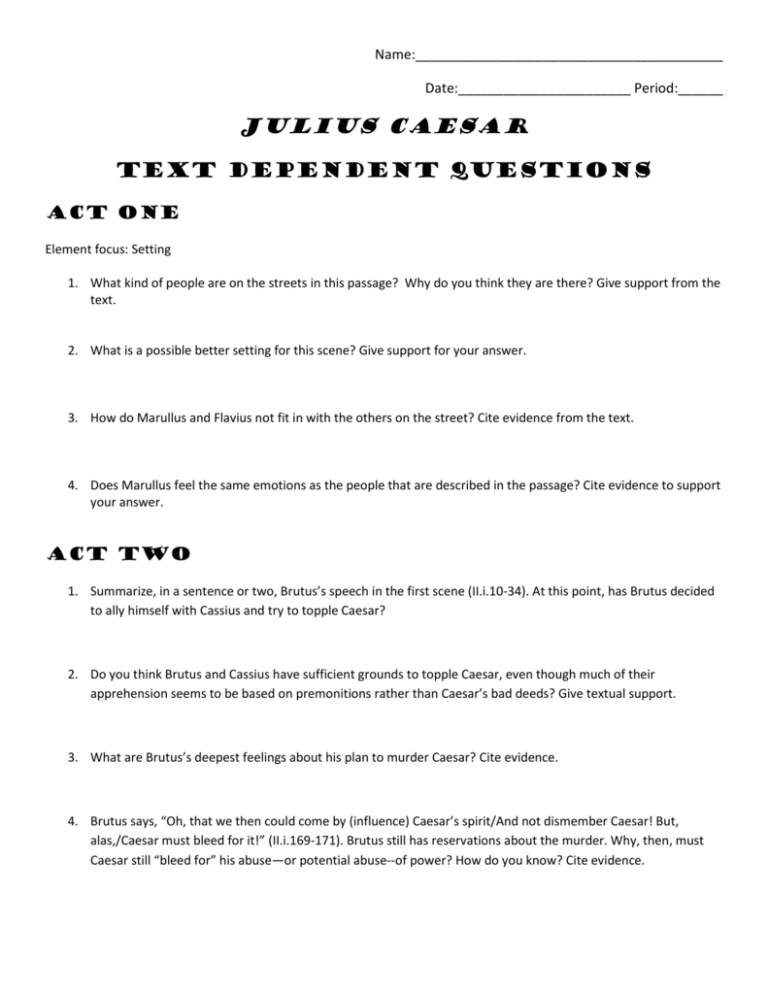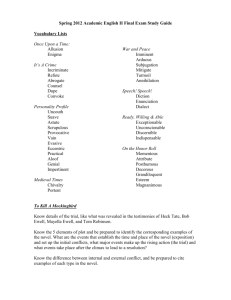Julius Caesar
advertisement

Name:_________________________________________ Date:_______________________ Period:______ Julius Caesar Text Dependent Questions Act One Element focus: Setting 1. What kind of people are on the streets in this passage? Why do you think they are there? Give support from the text. 2. What is a possible better setting for this scene? Give support for your answer. 3. How do Marullus and Flavius not fit in with the others on the street? Cite evidence from the text. 4. Does Marullus feel the same emotions as the people that are described in the passage? Cite evidence to support your answer. AcT Two 1. Summarize, in a sentence or two, Brutus’s speech in the first scene (II.i.10-34). At this point, has Brutus decided to ally himself with Cassius and try to topple Caesar? 2. Do you think Brutus and Cassius have sufficient grounds to topple Caesar, even though much of their apprehension seems to be based on premonitions rather than Caesar’s bad deeds? Give textual support. 3. What are Brutus’s deepest feelings about his plan to murder Caesar? Cite evidence. 4. Brutus says, “Oh, that we then could come by (influence) Caesar’s spirit/And not dismember Caesar! But, alas,/Caesar must bleed for it!” (II.i.169-171). Brutus still has reservations about the murder. Why, then, must Caesar still “bleed for” his abuse—or potential abuse--of power? How do you know? Cite evidence. 5. Why do you think Caesar has grown “superstitious of late”? (II.i.195) Explain the quote and show how Caesar’s character may be changing. 6. Do you think Brutus is lying to his wife, Portia, when he tells her he is “not well in health”? (II.i.257) Explain your thinking. 7. Calpurnia tells her husband, Caesar, “When beggars die, there are no comets seen; the heavens themselves blaze forth the death of princes” (II.ii.30-31). Explain in reference to Caesar’s rule of Rome. 8. Caesar says, “Cowards die many times before their deaths; the valiant taste of death but once” (II.ii.32-33). Explain what is going on at this point in the play and relate it to Caesar’s characterization. [Note: This line is one of Shakespeare’s most famous.] 9. Why is it significant that Caesar tells one of his murderers, Decius, “I love you”? (II.ii.74) [Note the play on Decius’s name: To die is to become “deceased”.] 10. Do you think the conspirators are motivated by “emulation” (envy) as Artemidorus says they are? Why or why not? (II.iii.11) Act Three 1. “Et tu (you, too?), Brute? Then fall, Caesar!” says Caesar, dying (III.i.77). What do his dying words say about Caesar’s regard for Brutus’s opinion? Do you think he might have meant anything else by the question? 2. On Caesar’s demise, Brutus says, “Ambition’s debt is paid” (III.i.83) Explain the meaning of this statement, uttered by Brutus on Caesar’s demise. 3. Summarize Antony’s sentiments toward Caesar after the murder is committed? (Consult III.iii.148-163, III.iii.183210, and III.i.254-275, for this question.) 4. Why does Antony befriend Brutus, Cassius, and the other conspirators? Cite evidence. 5. Explain what Brutus means when he talks about Caesar’s ambition. According to his argument, when is “death” a suitable punishment for “ambition”? (III.ii.29) 6. “I have done no more to Caesar than you shall do to Brutus,” says Brutus in his funeral speech. Explain in reference to question 1, above. (III.ii.36-37) Does Brutus expect to be murdered, too? (III.ii.45-47) 7. “And Brutus is an honorable man,” is the refrain of Mark Antony’s famous eulogy of Caesar on page 955-956 (III.ii.74-108; 119-138). Given his expressed love for the fallen leader, this refrain conveys Antony’s anger at the murderers through irony—saying one thing but meaning something quite the opposite. But Antony admits, credibly, that he “does not know” the whole story of Caesar’s so-called “ambition” and thus leaves himself—and Brutus and the conspirators—the option to celebrate the murderous act once he knows more. Practice saying this complex oration aloud and try to provide this refrain with an inflection that conveys Antony’s hostility. 8. Perceiving that he has raised the ire of the crowd to bloodthirstiness, Antony’s sarcasm turns mellow; when, at III.ii.215, he reiterates that the conspirators “are wise and honorable”, he seems to mean it and urges the people to listen carefully to the reasons given by the conspirators for the murder. What was Antony’s true purpose in the eulogy? Did he achieve it or not, given the fact that the crowd does, in fact, go off to kill Brutus? Act Four 1. What is the thematic significance of Portia’s death? That is, why do you think the playwright thought it just that the lead conspirator and usurper, Brutus, should lose his wife as a result of his having participated in the conspiracy? (IV.iii.146-158) 2. Brutus says, “There is a tide in the affairs of men which, taken at the flood, leads on to fortune; omitted, all the voyage of their life is bound in shallows and miseries” (IV.iii.217-220). [This is another of Shakespeare’s most famous lines.] Explain the meaning and significance of this statement to the war between the legions of Antony and Brutus. 3. Summarize, in a sentence or two, Act IV’s importance to the play. AcT Five 1. “O Julius Caesar! Thou art mighty yet. Thy spirit walks abroad and turns our swords in our own proper entrails” (V.iii.94-96) What truth about wars might this speech by Brutus be said to acknowledge? 2. What event does this speech (“O Julius Caesar …”) presage or foreshadow? (V.iii.94-96) 3. Mark Antony’s speech establishes, once and for all, that Brutus’s intentions were honorable, and his sincerity in working for the ultimate good of the Roman people genuine. What, then, does Octavius mean when he suggests that the victorious forces of Antony “use” his memory by staging a “respectful” burial? What significance might such a funeral have for the Roman state? (V.v.76-81) 4. Now that you have read the play in its entirety, decide for yourself whether or not Shakespeare believed that the murder of Caesar was in the best interests of the Roman people? To answer this question, reflect upon the facts of the play: who lives? (were their acts just?), who dies? (were their acts unjust?), and how do the speeches associated with their deaths shed light on the way the playwright would judge them and their actions? 5. Since Brutus himself is said to have been “the noblest Roman of all” (V.v.68), why do you think Shakespeare kills him off before the play’s conclusion? That is, is Shakespeare conveying any message, moral or practical, by killing him off? [Remember: The reader must assume that nothing in such a play is included by accident.]





